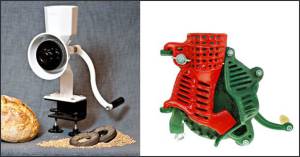Table of Contents
Flint corn
We wanted to have corn for drying, for corn meal in particular. We are in a community garden in Fall City where two other wanted to grow sweet corn. We believed that cross-pollination would affect one or more of these crops. So we found a garden outside the city where we could grow whatever kind of corn we wanted. We call that garden the Fall City Farm, or Circus Cyaneus for the Harrier Hawks that sometimes stage aerial shows nearby.
Lots of weeding
The “Farm” hadn't been cultivated for a couple of years so we started from scratch, weeding, tilling, weeding, tilling until we had a suitable seed bed.
Soil preparation
We didn't know the physical makeup of this soil so we didn't make any unusual amendments as we prepared the soil. We added extra kelp or seed meal for trace elements to our standard organic fertilizer recipe.
Corn variety
We purchased Cascade Ruby Gold from Adaptive Seeds based on Carol Deppe's recommendation.
About corn
One thing I like about corn is that it is relatively low maintenance. We keep the weeds out and let the soil moisture in the soil take care of water needs.
Yield
We planted around 240 seeds and had about 200 sprout and grow. I'm guessing we had 240 to 300 ears of corn, though a few suffered from mildew when the rains came before they were really ready.
Regardless, we have at least a five-year supply of flint corn, with several pound of corn meal and corn flour in the cupboard.
Saving seeds
Saving these corn seeds is easiest for flint corn, especially since this patch was isolated from other corn fields. When we want to plant more flint corn, we take some corn kernels and plant them.
More equipment
 To prepare the flint corn we purchased a grinder (Wonder Junior Deluxe Grain Mill) and a sheller (Maximizer Hand Corn Sheller) both from Pleasant Hill Grain.
To prepare the flint corn we purchased a grinder (Wonder Junior Deluxe Grain Mill) and a sheller (Maximizer Hand Corn Sheller) both from Pleasant Hill Grain.
Flint corn photos
See the gallery of flint corn photos
